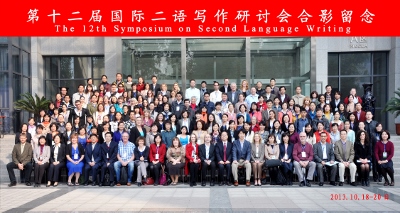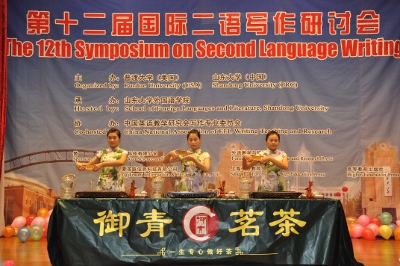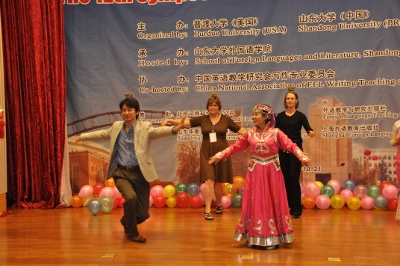|
This past October, the Symposium on Second Language Writing was
held at Shandong University, in Jinan, China. The symposium is an
annual international conference dedicated to the development of the
field of second language writing. The theme of this year’s symposium,
“L2 Writing in the Global Context: Represented, Underrepresented, and
Unrepresented Voices,” was fully and successfully realized.
Plenary speakers were invited from different parts of the world
to talk about the state of second language writing studies in their own
country or region. The plenary speakers that spoke on the represented
contexts were Tony Silva (the United States), John Bitchener (New
Zealand), Alister Cumming (Canada), and Neomy Storch (Australia). The
underrepresented voices were spoken for by Junju Wang (China), Yeon Hee
Chol (South Korea), Icy Lee (Hong Kong), Yichun Liu (Taiwan), Melinda
Reichelt (Germany), and Miyuki Sasaki (Japan). The unrepresented were
given voice by Fatima Esseili (Lebanon), Diane Pecorari (Sweden), Lukasz
Salski (Poland), and Tetyana Yakhontova (Ukraine).
|

Symposium Presenters and Attendees (click to enlarge)
|
In addition to the wide coverage of countries and regions, the
symposium received more than 240 submissions from all over the world. In
the end, the symposium had over 100 concurrent sessions with presenters
from more than 20 countries and regions, including Australia, Canada,
China, Costa Rica, Hong Kong, Iran, Japan, Kazakhstan, Macau,
Madagascar, Malaysia, New Zealand, Qatar, Oman, Singapore, South Korea,
Sweden, Taiwan, Thailand, the United States, the United Kingdom,
Ukraine, and United Arab Emirates. This wide range of presenters brought
valuable insights on various topics related to second language writing
from all over the world.
Topics discussed at this year’s symposium ranged from
computer-mediated communication to writer variables, from curriculum
development to writing centers, and from text analysis to corrective
feedback. The represented, underrepresented, and unrepresented voices
were all fully represented at the symposium. All attendees of the
symposium were able to explore, communicate, and share in a
professional, scholarly, and friendly environment.
|

Tea Ceremony Performance
|
Beyond mere academic communication, this year’s symposium also
featured various activities for the attendees to socialize, to renew
acquaintances, and to meet new friends. These activities included
Chinese tea art performance and other traditional Chinese arts, such as
calligraphy, painting, dancing, and traditional Chinese musical
performance.

Plenary Speakers Learn Traditional Mongolian Dance
Attendees were also able to participate in sightseeing to Mount
Tai or Qu Fu, both of which are strong representations of traditional
Chinese culture and architecture. Mount Tai, a place of worship for at
least 3,000 years, has historical and cultural significance, and Qu Fu
is the hometown of Confucius.
Overall, the 2013 Symposium on Second Language Writing was a
great success, with many important academic conversations taking place.
These conversations have helped to expand the knowledge of the field of
second language writing and to set up the 2014 Symposium on Second
Language Writing for success. The 2014 symposium will be held at Arizona
State University, in the United States, November 13–15, with the theme
of “Professionalizing Second Language Writing.” For more information and
updates, please visit http://sslw.asu.edu/2014.
Cong Zhang is a PhD student in the English Department
at Purdue University, where she teaches first-year composition for
international students. Her research interests include second language
writing, teaching English as a second/foreign language, and World
Englishes.
Joshua M. Paiz is a PhD student in the English
Department at Purdue University. He currently teaches in the composition
program and is the content coordinator for the Purdue Online Writing
Lab (OWL). His research interests include professional identity and
queer issues in TESOL and OWLs for L2 writing support.
|

